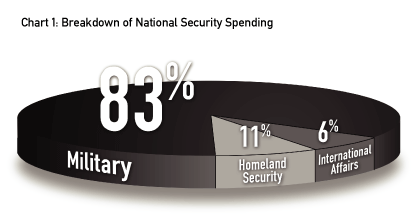In its infinite wisdom, the Senate Budget Committee slashed $4.1 billion from President Bush’s proposed International Affairs budget.
International Affairs, which includes our diplomacy, development and international organization expenses, comprises just over 1.2% of our total federal budget and 6% of our national security spending. It accounts for almost all of our global non-military footprint.
Even with full funding at the level of the President’s request, we’re facing a crisis with peacekeeping. Our current debts are being absorbed by troop contributing countries like India, Pakistan, Kenya, and Bangladesh, but they won’t continue to absorb the debt forever. That means critical missions will be crippled. And President Bush, even with his high request for International Affairs funding generally, has proposed a dollar amount for peacekeeping contributions that House Foreign Affairs Committee Chairman Howard Berman has called “absurdly low.” That’s because the Office of Management and Budget has decided each year to make across-the-board cuts in this area despite our aggressive diplomacy in the UN Security Council to establish and expand peace operations where they are needed.

The military is our hammer and our current budget priorities reflect our view that all of the global challenges we face are nails. Believe it or not, much of the pushback against this view is coming from the Pentagon. Bob Gates has become refreshingly outspoken on the subject:
“Funding for non-military foreign-affairs programs has increased since 2001, but it remains disproportionately small relative to what we spend on the military and to the importance of such capabilities. Consider that this year’s budget for the Department of Defense — not counting operations in Iraq and Afghanistan — is nearly half a trillion dollars. The total foreign affairs budget request for the State Department is $36 billion – less than what the Pentagon spends on health care alone. Secretary Rice has asked for a budget increase for the State Department and an expansion of the Foreign Service. The need is real.
…
“Overall, our current military spending amounts to about 4 percent of GDP, below the historic norm and well below previous wartime periods. Nonetheless, we use this benchmark as a rough floor of how much we should spend on defense. We lack a similar benchmark for other departments and institutions.
“What is clear to me is that there is a need for a dramatic increase in spending on the civilian instruments of national security – diplomacy, strategic communications, foreign assistance, civic action, and economic reconstruction and development. Secretary Rice addressed this need in a speech at Georgetown University nearly two years ago. We must focus our energies beyond the guns and steel of the military, beyond just our brave soldiers, sailors, Marines, and airmen. We must also focus our energies on the other elements of national power that will be so crucial in the coming years.
“Now, I am well aware that having a sitting Secretary of Defense travel halfway across the country to make a pitch to increase the budget of other agencies might fit into the category of “man bites dog” – or for some back in the Pentagon, “blasphemy.” It is certainly not an easy sell politically. And don’t get me wrong, I’ll be asking for yet more money for Defense next year.
“Still, I hear all the time from the senior leadership of our Armed Forces about how important these civilian capabilities are. In fact, when Chairman of the Joint Chiefs of Staff Admiral Mike Mullen was Chief of Naval Operations, he once said he’d hand a part of his budget to the State Department “in a heartbeat,” assuming it was spent in the right place.”
The amendment to restore the $4.1 billion will be proposed tomorrow by Sens. Biden and Lugar. But let’s be clear: I wrote about this last year and will probably say something again next year. This amendment is a minor adjustment, not the radical recalibration that is required.
— Scott Paul


5 comments on “Smart Power Vote Coming Tomorrow in Senate”